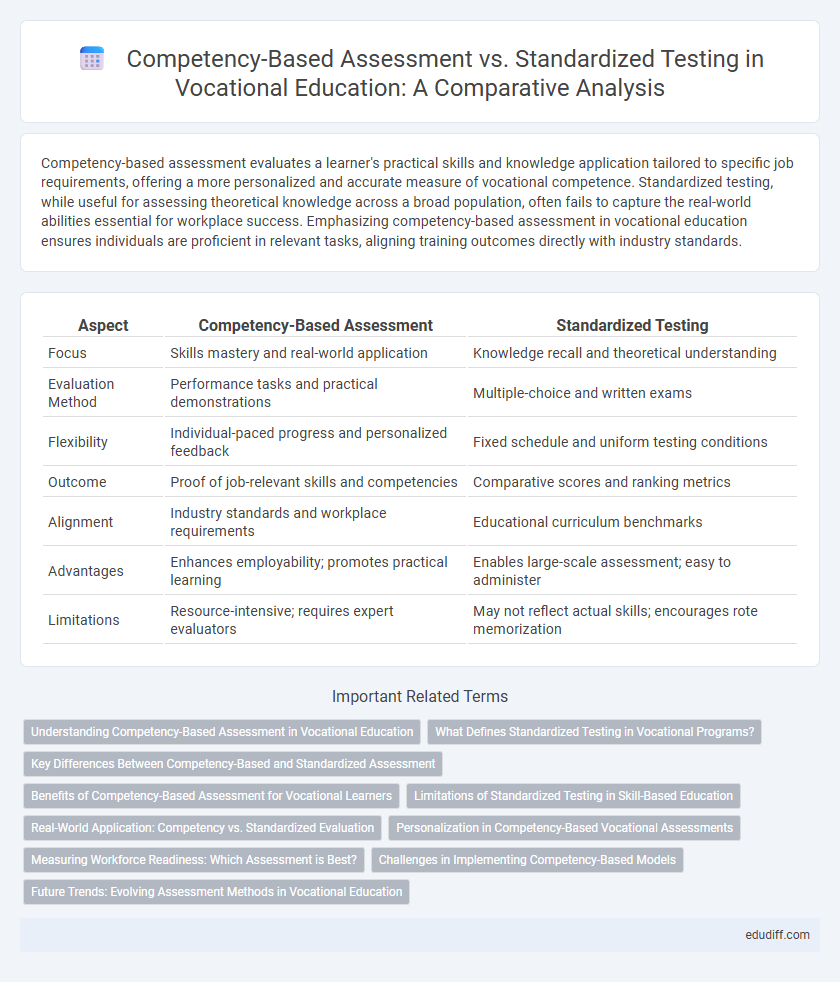Competency-based assessment evaluates a learner's practical skills and knowledge application tailored to specific job requirements, offering a more personalized and accurate measure of vocational competence. Standardized testing, while useful for assessing theoretical knowledge across a broad population, often fails to capture the real-world abilities essential for workplace success. Emphasizing competency-based assessment in vocational education ensures individuals are proficient in relevant tasks, aligning training outcomes directly with industry standards.
Table of Comparison
| Aspect | Competency-Based Assessment | Standardized Testing |
|---|---|---|
| Focus | Skills mastery and real-world application | Knowledge recall and theoretical understanding |
| Evaluation Method | Performance tasks and practical demonstrations | Multiple-choice and written exams |
| Flexibility | Individual-paced progress and personalized feedback | Fixed schedule and uniform testing conditions |
| Outcome | Proof of job-relevant skills and competencies | Comparative scores and ranking metrics |
| Alignment | Industry standards and workplace requirements | Educational curriculum benchmarks |
| Advantages | Enhances employability; promotes practical learning | Enables large-scale assessment; easy to administer |
| Limitations | Resource-intensive; requires expert evaluators | May not reflect actual skills; encourages rote memorization |
Understanding Competency-Based Assessment in Vocational Education
Competency-based assessment in vocational education emphasizes evaluating learners through practical skills and real-world tasks aligned with industry standards, ensuring mastery of specific competencies rather than theoretical knowledge alone. This approach prioritizes personalized progression, allowing students to advance upon demonstrating required skills, which fosters deeper understanding and job readiness. Unlike standardized testing, competency-based assessment adapts to individual learning paces and focuses on measurable outcomes directly linked to vocational performance.
What Defines Standardized Testing in Vocational Programs?
Standardized testing in vocational programs is defined by uniform assessment tools that measure learners' knowledge and skills against predetermined industry benchmarks. These tests ensure consistency, comparability, and objectivity by utilizing fixed formats and scoring criteria across all candidates. The primary goal is to validate competence through reliable metrics that reflect occupational standards and regulatory requirements.
Key Differences Between Competency-Based and Standardized Assessment
Competency-based assessment evaluates learners' skills and knowledge through practical, real-world tasks aligned with specific job functions, ensuring mastery of relevant competencies. Standardized testing measures performance using uniform tests designed for large populations, focusing on theoretical knowledge and comparative scoring. Competency-based assessments emphasize personalized progress and application, while standardized tests prioritize norm-referenced evaluation and consistency across candidates.
Benefits of Competency-Based Assessment for Vocational Learners
Competency-based assessment offers vocational learners personalized evaluation aligned with real-world skills, enhancing job readiness by focusing on practical expertise rather than theoretical knowledge. This approach allows learners to progress at their own pace, ensuring mastery of specific competencies crucial for industry demands. Employers benefit from graduates who demonstrate verified skills, improving workforce quality and reducing training costs.
Limitations of Standardized Testing in Skill-Based Education
Standardized testing often fails to accurately measure practical skills critical in vocational education due to its reliance on multiple-choice or written formats that do not replicate real-world tasks. This limitation results in assessments that overlook hands-on competencies such as technical proficiency, problem-solving abilities, and workplace communication. Consequently, competency-based assessment provides a more valid evaluation by directly observing and measuring vocational skills in authentic contexts.
Real-World Application: Competency vs. Standardized Evaluation
Competency-Based Assessment centers on evaluating a learner's practical skills and real-world application of knowledge, ensuring readiness for specific vocational tasks. Standardized Testing measures performance through uniform, often theoretical, questions that may not directly correlate with job-specific competencies. Emphasizing competency fosters a more accurate representation of an individual's ability to perform in actual occupational settings, enhancing workforce preparedness.
Personalization in Competency-Based Vocational Assessments
Competency-based vocational assessments emphasize personalization by tailoring evaluation methods to individual learners' skills, experiences, and career goals, enhancing relevance and engagement. Unlike standardized testing, these assessments measure practical competencies through real-world tasks, allowing for customized feedback and targeted skill development. This personalized approach fosters deeper learning and better prepares individuals for specific vocational roles and industry demands.
Measuring Workforce Readiness: Which Assessment is Best?
Competency-based assessment evaluates practical skills and job-specific abilities, directly aligning with workforce readiness by measuring how candidates perform real-world tasks. Standardized testing primarily assesses theoretical knowledge and general aptitude but may not fully capture an individual's capacity to execute job functions effectively. Employers seeking to gauge true workforce readiness often prefer competency-based assessments due to their targeted and hands-on evaluation approach.
Challenges in Implementing Competency-Based Models
Competency-based assessment faces challenges such as ensuring consistent evaluation criteria across diverse practical tasks and aligning industry-relevant skills with academic standards. Standardized testing struggles to measure complex competencies like critical thinking and hands-on abilities, making integration with competency-based models difficult. Developing reliable assessment tools and training assessors for subjective judgment are critical hurdles in adopting competency-based vocational education globally.
Future Trends: Evolving Assessment Methods in Vocational Education
Competency-based assessment in vocational education increasingly integrates digital simulations and real-time skill tracking, providing personalized and adaptive evaluation tailored to individual learning paces. Standardized testing faces challenges from these dynamic methods, which offer deeper insights into practical competencies and job readiness crucial for future labor markets. Emerging technologies like AI-driven analytics and virtual reality environments are set to redefine assessment accuracy, engagement, and relevance in vocational training programs.
Competency-Based Assessment vs Standardized Testing Infographic

 edudiff.com
edudiff.com